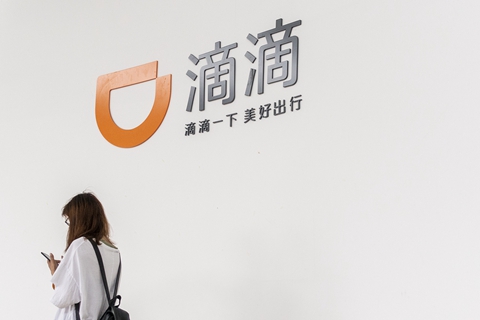Didi Moves Ahead in Self-Driving Auto Race

Chinese ride-hailing giant Didi Chuxing Technology Co. has been testing self-driving vehicles in four cities in China and the U.S., gearing up for the fledgling technology in a race with global rivals.
Didi has set up fleets of dozens of self-driving vehicles and launched road tests in four Chinese and American cities, company co-founder and Chief Technology Officer Zhang Bo said Thursday.
Didi joins a number of tech majors, including car-hailing rival Uber Technologies Inc. and internet giants Google and Baidu Inc., in a race to develop autonomous driving technology for public transport.
Zhang didn’t elaborate on which cities Didi is using to test the fleets. In May, Didi won approval to launch live trials of autonomous vehicles on roads in California.
Several Chinese cities, including Beijing, Shanghai, Shenzhen and Chongqing, have issued licenses for road tests of autonomous vehicles. The Hangzhou city government in Zhejiang province said earlier this month that it will allow licensed companies to launch self-driving tests starting Monday.
Ride-sharing businesses will provide one of the most applicable commercial solutions for self-driving technology over the next 10 years, Zhang said, adding that the company is aiming to become one of the top players in the world.
Didi is China’s largest ride-hailing service provider since it acquired Uber’s China operation in 2016, ending years of costly turf wars. Didi commands more than 90% of China’s ride-hailing market with 550 million registered users. The company said the number of daily rides it provides has reached 30 million, with more than 30 million drivers active on its platform.
But Didi faces rising challenges from existing and new rivals, forcing it to step up business expansion and new technology development.
Earlier this year, Didi CEO Cheng Wei told the Financial Times that the company is set to launch autonomous taxis in 2019.
Ride-hailing service providers are counting on the self-driving technology as a key to reducing costs while improving efficiency. Lyft said in May that it will deploy 30 self-driving vehicles in Las Vegas later this year. Uber has said it expects to have fully autonomous cars in operation as early as next year.
Internet giants have also joined the fight to capture the emerging market. Google’s self-driving unit, Waymo, said it will launch autonomous taxi services in Phoenix, Arizona, by the end of this year. The company has been testing more than 600 self-driving vehicles in 25 American cities.
Chinese search engine Baidu said last month that it was close to rolling out China’s first autonomous buses ready for commercial use and that it planned to put 100 self-driving minibuses on the road, which will have no steering wheel, driver’s seat, accelerator or brake pedal.
But safety is still a major concern for self-driving services. Such concern was highlighted after a March accident in which an Uber vehicle struck and killed a pedestrian crossing a street in Arizona.
Zhang said Didi will continue investing heavily in self-driving vehicles as well as related technologies such as internet-connected cars, voice-control systems and smart city transport. Didi has set up a partnership with 20 Chinese cities to use its technology in urban traffic control to reduce congestion, Zhang said.
Didi has spent most of its income on research and development, including 70% on ride-sharing system-building, 20% on smart urban transportation systems and 10% on electric and self-driving vehicles, according to Zhang.
Contact reporter Han Wei (weihan@caixin.com)

- 1Cover Story: China Carves Out a Narrow Path for Offshore Asset Tokenization
- 2Drownings Shake Chinese Enthusiasm for Travel to Russia
- 3China Business Uncovered Podcast: A $15 Billion Bitcoin Seizure and the Fall of a Cybercrime Kingpin
- 4Over Half of China’s Provinces Cut Revenue Targets
- 5Li Ka-Shing’s Port Empire Hit by Forced Takeover Amid Panama Legal Dispute
- 1Power To The People: Pintec Serves A Booming Consumer Class
- 2Largest hotel group in Europe accepts UnionPay
- 3UnionPay mobile QuickPass debuts in Hong Kong
- 4UnionPay International launches premium catering privilege U Dining Collection
- 5UnionPay International’s U Plan has covered over 1600 stores overseas






